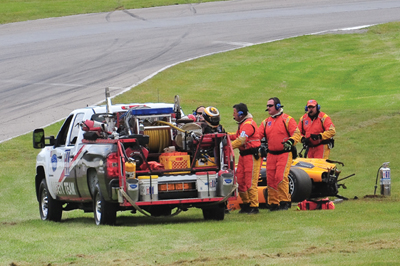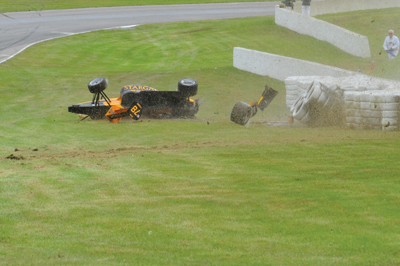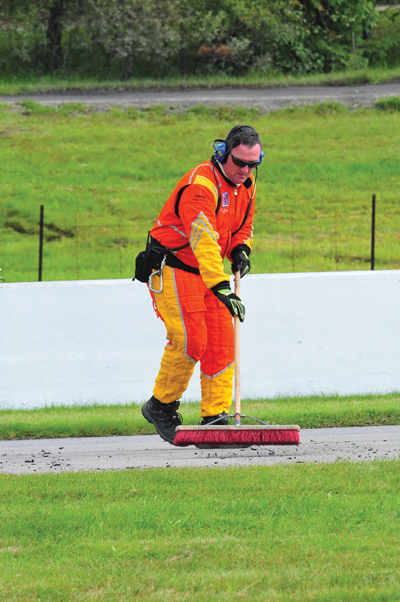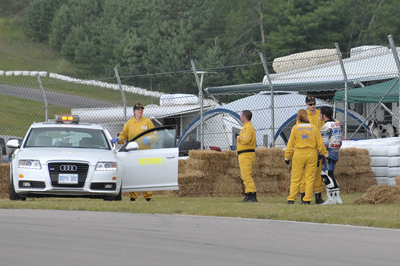
Headlines
News
The fast track
This story is about a group of volunteers who run a “professional” safety service for the racers at Mosport International Raceway just north of Bowmanville, Ont., and the Toronto Grand Prix/Indy races.
January 8, 2010
By Keith Hamilton
This story is about a group of volunteers who run a “professional” safety service for the racers at Mosport International Raceway just north of Bowmanville, Ont., and the Toronto Grand Prix/Indy races.
In 2008, I wrote about the International Motor Sport Association (IMSA) safety team that travels North America to supply medical and fire/extrication support for the American Le Mans Racing series (“Life In The Fast Lane”, Fire Fighting In Canada November 2008). While interviewing the IMSA safety team I learned that some team members are also local volunteers and that the Mosport track has its own team that supplies medical and fire safety for the professional race series at the track. The safety team that supplies medical and fire-fighting services during the racing season at Mosport is the Ontario Race Physicians (ORP). The group is always looking for recruits.
 |
|
| Photos by Keith Hamilton. Cooper Atlantic Championship series driver Simona De Silvestro crashes in corner two at the Mosport Race Track in Bowmanville, Ont., bringing out the IMSA safety team. The team is responsible for the driver’s safety and health and for making the racetrack safe for participants by removing the car and any debris from the track.
|
Mosport International Raceway
Ontario Race Physicians was started by doctors who were racing on the Mosport track and realized the need for quick medical and fire intervention in the case of an accident. The team has expanded to provide medical and fire support for all of the professional race weekends at Mosport and several private events. (The history of ORP and other information is available at www.racemedical.com/)
The ORP is contracted by Mosport International Raceway and the Toronto Grand Prix/Indy to provide medical and emergency fire/extrication support. There is a fee for its services but only to help the team buy equipment. Except for a minor fee for the doctors who are under contract – mostly to cover their insurance – all the safety workers are volunteers. To save on expenses and to help the volunteers get to know each other, many team members camp out in the track infield for events (although there is a hotel available).
 |
|
Kevin Tripp, a firefighter with the Brampton Fire and Emergency Services in Ontario, and a former paramedic, is the team’s fire/rescue co-ordinator. In the beginning, team members were brought on as required, usually through personal contacts, but for many years now the team has actively recruited volunteers through the paramedic and firefighting programs at Ontario community colleges.
ORP advertises for volunteers starting in January. Students receive training and experience under the watchful eyes of professional safety workers. Full-time and part-time working paramedics and firefighters can use the opportunity to learn new aspects of their professions and network with others from various services. The one-day, in-house training program consists of the theory of providing medical and fire safety at a race track and includes information on safely working around race cars, motorcycles and the various vehicles that team members will encounter on the track.
On the practical training day at Mosport, recruits go through multiple scenarios with various race cars that have been donated by drivers; they are shown areas of the track so they can discuss accident situations and are taught and practise fire suppression on a “burn car”.
 |
|
| Photo by Keith Hamilton. Volunteers with the Ontario Race Physicians racetrack safety team participate in several events during the racing season. Events occur on weekends, usually Friday through Sunday. The ORP recruits through Ontario colleges that offer firefighting and paramedic programs but students from other provinces are welcome to apply.
|
Instructors perform heavy tool extrication on non-race vehicles and discuss similarities and differences to race vehicles. All team members are cross trained for medical and firefighting duties. The race cars are used to illustrate driver extrication techniques. Paramedics are trained to back up the fire crews and fire crews are trained to back up the paramedics. When there are sufficient numbers of doctors, the team can respond on the safety trucks to on-track incidents. Doctors receive the same training as other crew members and must have completed the process before they can work trackside with the safety team.
Some team members volunteer with other safety organizations or race series such as NASCAR and IMSA. Presently, there are just two safety teams that travel with their racing series – the IMSA team with American Lemans Series and the Indy Racing League team with Indy Racing. During the Toronto Indy (cancelled in 2009 due to lack of sponsorship but returning this year), many ORP team members work alongside Toronto EMS paramedics because of their race car/track training. Team members are encouraged to join other race-track safety teams and to complete the race marshalling/flaggers school. Once members have sufficient training and experience the team helps them make contacts so they can travel and work with other safety teams and gain more experience.
Teams are mainly responsible for on-track events. ORP also provides crews in the “pits” for many events. This is the most dangerous area of any race track, with a constant threat of fire and a strong potential for traumatic or medical emergencies. Team members also provide assistance in the paddock areas and to the spectators as required.
The ORP team is contracted for seven or eight pro events each year. Events occur on weekends, usually Friday through Sunday for a pro series event.
Application criteria
- Firefighters – volunteer or career firefighters or students who have taken and successfully passed their local provincial college course; firefighters from outside Ontario are welcome.
- Paramedics – full and part time or students who have completed their first year of a paramedic college course; first year students are limited in what they can do trackside.
- Nursing – preference is be given to emergency room or critical care nurses with ACLS and ATLS certifications.
- Doctors – hiring is handled differently and the preference is emergency room physicians with ACLS and ATLS certifications.
The team supplies a fire suit but volunteers must have their own helmets, balaclavas, boots, gloves, belts and gear.
Recruiting
Dave Geall is the training officer for ORP. He has also been a full-time advanced care paramedic since 1991 for Halton Region EMS in Ontario (west of Toronto). Geall was invited to participate in ORP about 17 years ago and is now in charge of recruiting and team marketing and sponsorship. Every spring, Geall and his team go into Ontario community colleges to recruit paramedic and firefighting students for ORP. Geall is looking for students finishing their first or second years of study. Training starts in late April or early May. Students attend classroom sessions at colleges to learn the basics of car racing including flags, rules and safety. Then, race car roll cages are brought in so students can practise extrication from a roll cage and students are shown tools that are unique to racing safety.
 |
|
| Photo by Keith Hamilton. A wet racetrack and two wheels make for difficult conditions during the Parts Canada Superbike Doubleheader Weekend at Mosport, one of several events during the season at which Ontario Race Physican members are on hand. |
After classroom orientation, students go to the racetrack to train on extinguishers that put out fuel fires, and extrication. Real race cars are brought in so students can practise packaging with the Kendrick Extrication Device (KED) and collaring, and the removal of injured drivers through the roll-cage system. This training also allows the firefighters and paramedics to understand the tools, roles and duties of the team members in both disciplines.
The team usually has seven events per season but may have up to nine this year. The team prefers that members attend as often as possible. Recruits are expected to attend the training and at least a few events; often it takes just a few months to determine if a member will enjoy the experience and continue to participate. Weekends are set up more as mini vacations than work, with the evenings for socializing and camping in the infield.
Paramedic or firefighters who are not studying at one of the Ontario colleges that Geall visits can contact him at dgeall@racemedical.com. Calls to potential volunteers start early in the year in order to have a recruiting list by the end of March. There will be at least two days of training by the end of April, because the first race of the season is in mid May. The mandatory commitment expected for a new volunteer is to attend the two training days and at least two events but it is hoped that recruits will attend as many events as possible. Most team members attend most events but the ORP sends out a calendar and notifies members about a month in advance of an event to see who is available. The core team members are actually growing, with members returning year after year.
Print this page